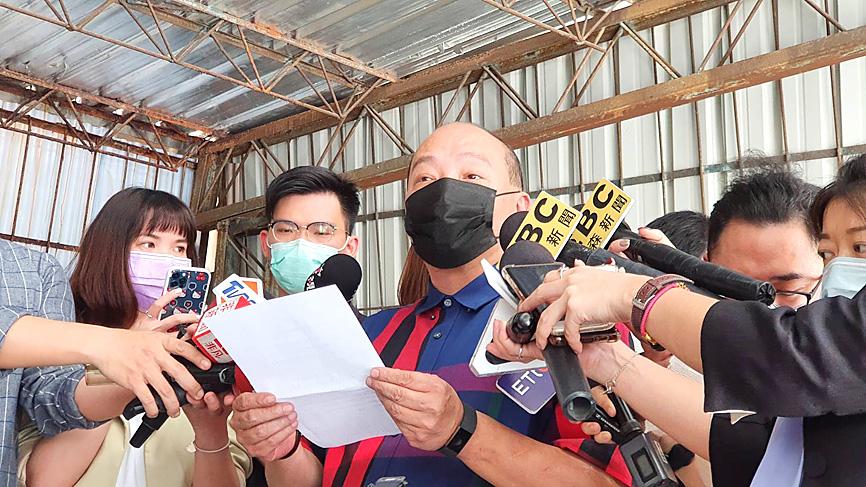An official at the Democratic Progressive Party’s (DPP) Taipei chapter on Friday said he would resign over allegations that his son had been implicated in a narcotics and fraud investigation.
Chao Ying-kuang’s (趙映光) son, Chao Chieh-yu (趙介佑), faces accusations of having been involved in racketeering, assault and kidnapping related to organized crime.
Chao Ying-kuang resigned as convener of the Taipei chapter’s review committee after earlier saying that his son should be expelled from the party.

Photo: Yang Hsin-hui, Taipei Times
Taipei chapter head Enoch Wu (吳怡農) said he had no prior knowledge of the accusations against Chao Chieh-yu.
Two days after hearing about the allegations, Wu initiated the expulsion of Chao Chieh-yu from the party through the chapter’s disciplinary committee, he said.
Chao Chieh-yu’s party membership would likely be revoked tomorrow as party bylaws require providing three days of advance notice before expelling a member, he added.
“We have zero tolerance for gangs. No one will be protected after breaking the law or contravening party discipline,” Wu said.
Premier Su Tseng-chang (蘇貞昌) yesterday said that “no one will be allowed to jeopardize the government’s integrity.”
President Tsai Ing-wen (蔡英文), who is also DPP chairperson, said in her first speech to the party following her re-election last year that integrity is a founding value of the DPP, Su added.
“Government integrity is a lifelong, personal tenet of mine, as a founding member of the DPP,” he said. “Anyone who contravenes this value should be held accountable through party discipline, and applicable laws should be enforced to the fullest.”
In a Facebook post yesterday, Chinese Nationalist Party (KMT) Legislator Cheng Cheng-chien (鄭正鈐) said that Tsai, as DPP chairperson, should “apologize and explain” the scandal surrounding the DPP’s Taipei chapter.
Chao Chieh-yu in 2016 was an adviser to Tsai’s presidential campaign office in Taipei, he said.
Tsai has told the National Police Agency that it must quash drugs, gangs and fraud, Cheng said.
“Would [Tsai] please start with the gangs and drugs in the DPP?” he added.
Additional reporting by Yang Kuo-wen and Lin Hui-chin

Foreign travelers entering Taiwan on a short layover via Taiwan Taoyuan International Airport are receiving NT$600 gift vouchers from yesterday, the Tourism Administration said, adding that it hopes the incentive would boost tourism consumption at the airport. The program, which allows travelers holding non-Taiwan passports who enter the country during a layover of up to 24 hours to claim a voucher, aims to promote attractions at the airport, the agency said in a statement on Friday. To participate, travelers must sign up on the campaign Web site, the agency said. They can then present their passport and boarding pass for their connecting international

Temperatures in northern Taiwan are forecast to reach as high as 30°C today, as an ongoing northeasterly seasonal wind system weakens, the Central Weather Administration (CWA) said. CWA forecaster Tseng Chao-cheng (曾昭誠) said yesterday that with the seasonal wind system weakening, warmer easterly winds would boost the temperature today. Daytime temperatures in northern Taiwan and Yilan County are expected to range from 28°C to 30°C today, up about 3°C from yesterday, Tseng said. According to the CWA, temperature highs in central and southern Taiwan could stay stable. However, the weather is expected to turn cooler starting tonight as the northeasterly wind system strengthens again

COOLING OFF: Temperatures are expected to fall to lows of about 20°C on Sunday and possibly 18°C to 19°C next week, following a wave of northeasterly winds on Friday The Central Weather Administration (CWA) on Sunday forecast more rain and cooler temperatures for northern Taiwan this week, with the mercury dropping to lows of 18°C, as another wave of northeasterly winds sweeps across the country. The current northeasterly winds would continue to affect Taiwan through today, with precipitation peaking today, bringing increased rainfall to windward areas, CWA forecaster Liu Pei-teng (劉沛滕) said. The weather system would weaken slightly tomorrow before another, stronger wave arrives on Friday, lasting into next week, Liu said. From yesterday to today, northern Taiwan can expect cool, wet weather, with lows of 22°C to 23°C in most areas,

Taiwan sweltered through its hottest October on record, the Central Weather Administration (CWA) said yesterday, the latest in a string of global temperature records. The main island endured its highest average temperature since 1950, CWA forecaster Liu Pei-teng said. Temperatures the world over have soared in recent years as human-induced climate change contributes to ever more erratic weather patterns. Taiwan’s average temperature was 27.381°C as of Thursday, Liu said. Liu said the average could slip 0.1°C by the end of yesterday, but it would still be higher than the previous record of 27.009°C in 2016. "The temperature only started lowering around Oct. 18 or 19